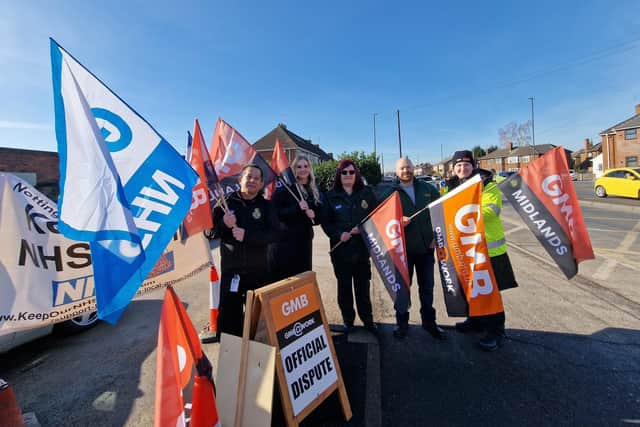‘Most challenging strike so far’ for East Midlands ambulance service as more than half on duty take part
and live on Freeview channel 276
The union GMB, which has the greatest share of EMAS union membership, secured a mandate for the strike alongside NHS nursing colleagues, who were represented by the Royal College of Nursing.
It was the latest strike to take place in the ongoing dispute between unions and the Conservative Government over pay and working conditions.
Advertisement
Advertisement
On Monday, February 6, both sides accused each other of failing to negotiate.


GMB is asking for a pay rise above inflation – currently 10.5 per cent, and other measures on working conditions and hours.
The Government says increasing this year’s existing pay award, worth roughly 4.75 per cent extra, is unaffordable, and instead says unions should start talking to them about next year’s deal.
During the latest EMAS board meeting, service bosses said it was the most challenging strike day so far, with preparations already under way for the next strike on February 20.
Advertisement
Advertisement
Ben Holdaway, EMAS operations director, said: “Overall just short of 60 per cent of people on duty took some form of action, whether that was a full strike or working to delegations, we’ve agreed it was 59 per cent of the workforce on duty.
“That was very similar in terms of Unite.
“What we saw, which was different to the strike day on January 11, was our activity shifted. We saw more activity than we have seen on previous strike days, so I am comparing strike day with strike day.
“In terms of calls, we had 12 per cent more calls than January 11, which is about 250 calls more. Incidents, there was a 25 per cent increase in incidents, when you look at the two strike days, which is about just under 500 more incidents.
“When you look at responses it was 15 per cent more.
“February 6 was the most challenging strike day we’ve had so far, with jobs outstanding and pressure on service delivery.”
Advertisement
Advertisement
Mr Holdaway said all outstanding jobs had been cleared as of 8am on February 7.
Richard Henderson, EMAS chief executive, stressed it was a dispute between staff and the Government, not the organisation itself.
He said: “We just need to make sure this issue is brought to a conclusion as quickly as possible
“The longer this goes on the more likely those pressures will get extended.
Advertisement
Advertisement
“Our approach with the trade unions and colleagues will continue in the vein that it has done so far.”
Health and Social Care Secretary Steve Barclay said: “NHS contingency plans are in place but these co-ordinated strikes will undoubtedly have an impact on patients and cause delays to NHS services.
“We accepted the recommendations of the independent pay review body to give over 1 million NHS workers, including nurses and ambulance workers, a pay rise of at least £1,400 this financial year, on top of an increase the previous year when wider public sector pay was frozen.
“I have been having constructive talks with unions about what is affordable for 2023/24.”
